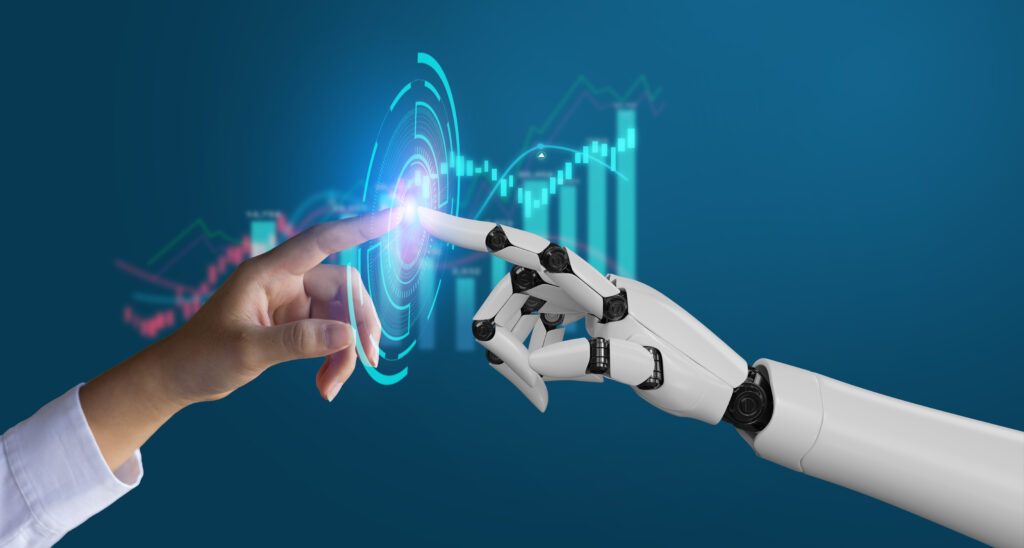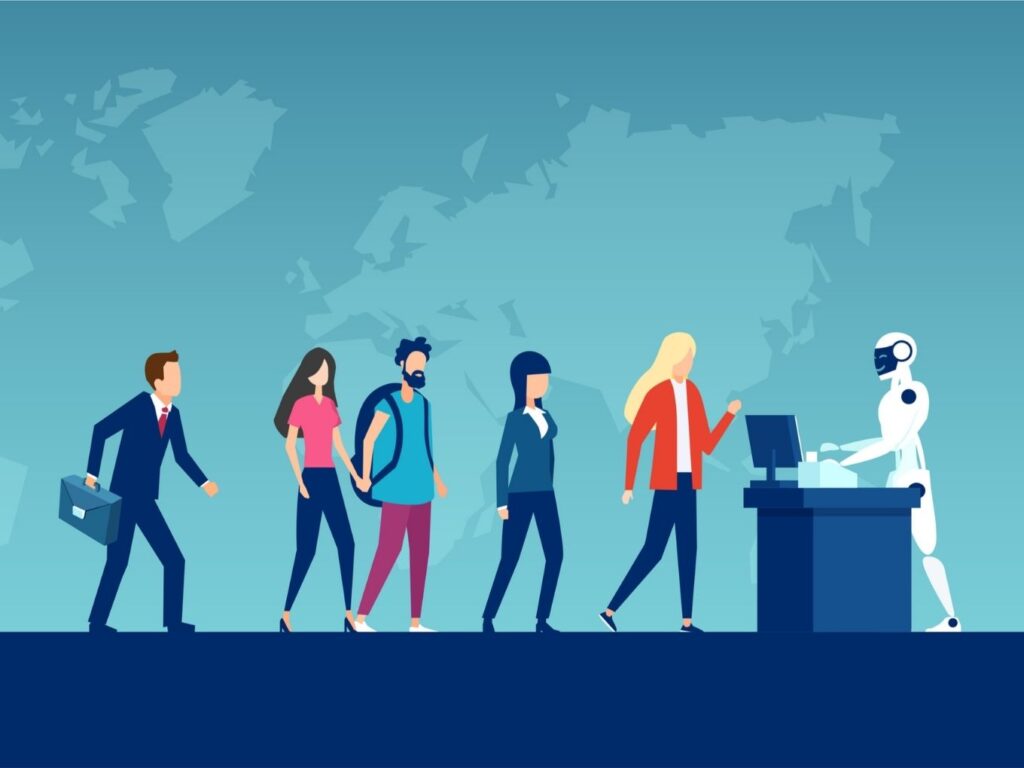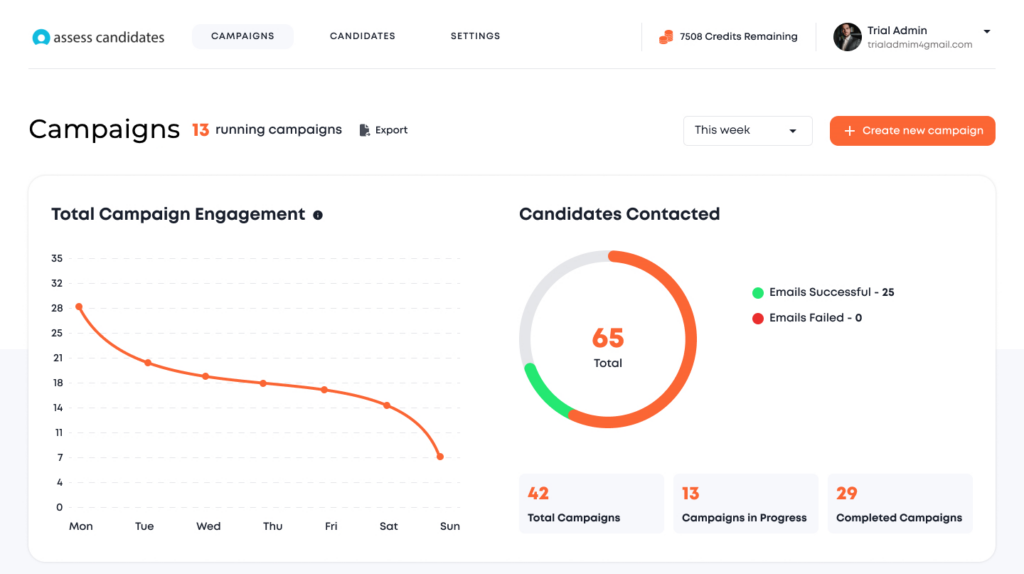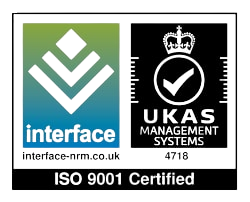How will A.I. tools impact pre-employment assessment tests?
In an era where technology continually reshapes the landscape of human resources, the impact of Artificial Intelligence (AI) on assessment tests cannot be overlooked. This article delves into the transformative role of AI tools in the area of recruitment assessment tests, illuminating how AI recruitment tools are revolutionising the way organisations evaluate candidates. From streamlining the screening process to reducing biases and delivering personalised assessments, AI is shaping the future of HR tech.
Wondering how AI can change recruitment at your company?Join us as we explore the profound influence of AI on the assessment landscape, analysing the potential benefits and challenges AI brings to recruitment.
Contents:
- What is AI in Assessment Tests?
- How can AI increase automation and efficiency in recruitment?
- How does use of AI reduce bias in candidate recruitment?
- What is the Future of AI in recruitment?
- Why should Assess Candidates be your AI recruitment partner?
- FAQS and Glossary of Terms
1. What is AI in Assessment Tests?
Let us start by understanding what AI is in assessment tests. This term relates to the application of Artificial Intelligence technologies to streamline and optimise the candidate evaluation process during recruitment. This includes automating routine tasks, such as initial resume screening, and employing advanced machine learning algorithms to analyse candidate responses and behaviour.
How can AI be used in recruitment? Real-life examples.
1. Personalization for Precision:
Vervoe, a pioneering company, embraces AI to offer personalised assessments. Vervoe’s AI-driven platform customises assessments based on candidate responses, ensuring that candidates face questions perfectly aligned with role requirements. If a candidate excels in a particular skill, the assessment adapts by introducing more advanced questions, while offering additional opportunities for improvement in areas of struggle. This personalised approach maximises evaluation precision.
2. Holistic Insights:
HireVue stands out by combining video interviews with AI analysis. HireVue’s system assesses candidates comprehensively, analysing not only what they say but also how they say it. AI evaluates tone, facial expressions, and body language, providing nuanced insights into candidates’ suitability for a role. This holistic evaluation enables recruiters to make more informed decisions. Game assessment publishers also leverage AI, such as Arctic Shores, to help employers make data-driven decisions.
3. Breaking the One-Size-Fits-All:
AI challenges the traditional one-size-fits-all approach. Unlike conventional assessments, AI-driven tools offer tailored experiences. Candidates are evaluated based on their unique strengths and weaknesses, allowing recruiters to identify the best fit for the role. AI-driven adaptability ensures a more efficient and effective assessment process.
Select from automated A.I. video interviews and game assessments. Hire For Free
2. How can AI increase automation and efficiency in recruitment?
Now that we have defined the meaning of AI in recruitment, let us look at AI’s transformative impact on recruitment and its ability to enhance automation and efficiency across various stages of the hiring process. By incorporating AI tools like chatbots, applicant tracking systems, interview scheduling platforms, resume screening tools, and skills assessment platforms, your company can reap the benefits of improved efficiency and enhanced candidate experiences in their recruitment processes.
5 Examples of how AI has been used by companies in recruitment
- Royal Bank of Scotland (RBS): RBS introduced ‘Luvo’, an AI chatbot designed to handle candidate inquiries and perform administrative tasks, freeing up valuable time for HR professionals. Luvo enhances candidate engagement and reduces HR workload.
- Greenhouse: Greenhouse offers an AI-driven applicant tracking system (ATS) used by companies like Airbnb and Pinterest. Greenhouse automates tasks such as resume screening and interview scheduling, significantly expediting candidate processing and improving overall recruitment efficiency.
72% of HR departments were expected to use AI-driven recruitment software for some aspect of the hiring process.
Gartner (2022)
- Workable: Workable is another AI-powered ATS trusted by companies like Slack and TransferWise. Workable streamlines the hiring process with automated candidate communication, interview scheduling, and collaboration features, allowing HR teams to focus on strategic activities.
- Hilton: Hilton utilises AI-driven interview scheduling tools. By implementing AI-powered platforms like Montage, Hilton has streamlined interview scheduling, improving the candidate experience and saving HR professionals valuable time.
- Unilever: Unilever leverages AI for resume screening. Unilever has integrated AI-driven resume screening tools like Pymetrics into its recruitment process. These tools analyse candidate resumes and assess their compatibility with job requirements, helping Unilever identify suitable candidates more efficiently.

3. How does the use of AI reduce bias in candidate recruitment?
Fair recruitment is a legal and moral obligation of all companies. AI plays a pivotal role in addressing bias in candidate recruitment, a longstanding challenge in the HR industry. By reducing bias in candidate assessments through these methods, AI fosters fair and equitable hiring practices, ultimately promoting diversity and inclusivity within organisations. This not only aligns with ethical imperatives but also enhances the overall quality of the workforce. Take a look at a few examples.
6 ways AI reduces bias in recruitment.
- Anonymisation: GapJumpers, a company specialising in blind auditions and unbiased candidate assessments, anonymizes applicant data during initial screening. AI algorithms evaluate candidates purely based on qualifications and skills, without access to personal information, thereby mitigating potential bias.
- Blind Auditions: Major tech companies like Google and Microsoft have implemented AI-driven blind auditions. Candidate demographic information remains concealed throughout the evaluation process, aligning with fairness and diversity principles and preventing unconscious bias.
- Objective Criteria: IBM uses AI to focus on objective criteria during assessments. By relying on data-driven metrics and standardised criteria, AI ensures that candidates are evaluated consistently, reducing subjectivity and bias.
- Unbiased Language Analysis: Textio, a company specialising in language analysis, helps organisations analyse language in job postings and candidate responses. AI detects and eliminates biased language, promoting gender-neutral and inclusive communication in job descriptions and interactions.
- Diverse Training Data: LinkedIn uses AI algorithms trained on diverse datasets. Ensuring that AI models are exposed to a wide range of demographics and backgrounds helps reduce biases in algorithmic decision-making.
- Continuous Monitoring and Improvement: Salesforce actively monitors and refines its AI systems. The company employs ongoing assessment and feedback mechanisms to identify and rectify bias in AI systems, making them more fair and equitable over time.
In a survey 33% of respondents reported that AI had significantly improved their quality of candidates by automating initial screening and reducing the chances of human bias.
Deloitte
Start your fair hiring today. View Plans
4. What is the Future of AI in recruitment?
We are currently only at the beginning of the technological journey with AI. The future of AI in assessments promises a trajectory of continuous innovation and integration. As technology advances, AI-driven tools will become increasingly sophisticated and integral to the assessment landscape. Recruiters like yourself need to constantly stay up to date with these advancements.

A recent study found that AI-driven tools reduced the time to fill a position by an average of 35% and reduced the cost per hire by 70%
Ideal
One noteworthy trend on the horizon is the integration of virtual reality (VR) assessments. Companies like PwC have already started using VR to immerse candidates in real-world scenarios for evaluation. This immersive approach provides a deeper understanding of candidates’ abilities and decision-making skills.
Additionally, AI will continue to refine predictive analytics in assessments. This means organisations like yours can expect more accurate identification of high-potential candidates based on historical data and patterns. Moreover, AI will provide actionable insights derived from assessments, empowering HR professionals to make data-driven hiring decisions.
68% of recruiters said that investing in new recruitment tech is the best way to improve hiring performance.
Some have argued the predictiveness of AI is skewed and determined by those who designed its parameters. For example, an extraverted leader is not necessarily sought after in all cultures but is often selected for in the West.

In summary, AI’s role in assessments is destined to revolutionise recruitment, making the process more precise, efficient, and tailored to the unique needs of companies. With that being said, the recruitment technology is still in its infancy, not yet tapping into the potential it brings. Assessment experts must maintain a keen eye to ensure fairness is carried forward along with convenience.
5. Why should Assess Candidates be your AI recruitment partner?
Assess Candidates is a forward-thinking HR tech firm specialising in AI-driven assessments, revolutionising recruitment by enhancing accuracy, efficiency, and fairness.
How Assess Candidates uses AI to help you make better hiring decisions
- Automated Technology: Assess Candidates is an easy-to-use hiring assessment platform providing intuitive controls to help you invite and assess candidates fast.
- Enhanced Candidate Experience: Our system will pull details from your campaign, such as length, company name and email and feed this into what a candidate sees upon assessment entry. This automated solution is one of many ways we target candidate engagement.
- Bias Reduction and Fairness: With AI at the core, we prioritise fairness and inclusivity. Our assessments are designed to reduce bias, ensuring that you make objective hiring decisions that align with your organisation’s values. Choose Assess Candidates for a smarter, more equitable, and efficient recruitment journey.

Practical example of how the Assess Candidates platform uses AI to enhance recruitment processes.
Problem:
The time taken to design and carry out recruitment campaigns consumes too much time of your HR personnel, resulting in costs of hiring that are not sustainable.
Assess Candidates Solution:
Our automated recruitment platform relies on advanced AI systems which take minimal time and effort from your recruiting teams. The platform administers the entire process of recruitment, from the initial data collection to various stages of assessment screenings, providing your hiring team with confidence and tangible results and actionable recommendations.
6. FAQS and Glossary of Terms
FAQs (Frequently Asked Questions):
- What is AI’s role in assessment tests?
- AI in assessment tests involves the use of Artificial Intelligence to automate, customise, and streamline the evaluation of candidates during recruitment processes.
- How can AI reduce bias in candidate recruitment?
- AI can reduce bias by anonymizing applicant data, using blind auditions, and focusing on objective criteria during assessments, ensuring a fair and equitable hiring process.
- What does the future hold for AI in assessments?
- The future of AI in assessments includes the integration of virtual reality (VR) assessments, advanced predictive analytics, and the provision of actionable insights to enhance recruitment processes.
- How does AI personalise assessment tests for candidates?
- AI personalises assessment tests by analysing candidate responses and adapting subsequent questions based on their performance. This ensures that candidates face questions that are relevant to their skill level, creating a tailored evaluation experience.
- What security measures are in place to protect candidate data in AI-driven assessments?
- AI-driven assessment providers typically employ robust data encryption, secure servers, and strict access controls to protect candidate data. They also adhere to data privacy regulations like GDPR and ensure data anonymization to safeguard applicant information.
- Can AI assess soft skills and emotional intelligence in candidates?
- Yes, AI can assess soft skills and emotional intelligence by analysing candidate responses to situational questions, video interviews, or written communication. Advanced AI algorithms can detect nuances in language and behaviour to gauge these important traits.
Glossary of Terms
- AI in Assessment Tests:
- AI in assessment tests refers to the application of Artificial Intelligence technologies to streamline and enhance candidate evaluation during recruitment, encompassing tasks like automation, customization, and bias reduction.
- Anonymization:
- Anonymization is the process of concealing or removing identifying information from candidate data during recruitment assessments to prevent bias and ensure fairness.
- Predictive Analytics:
- Predictive analytics is the use of historical data and patterns to predict future outcomes. In recruitment, it helps identify high-potential candidates based on their qualifications and performance in assessments.
